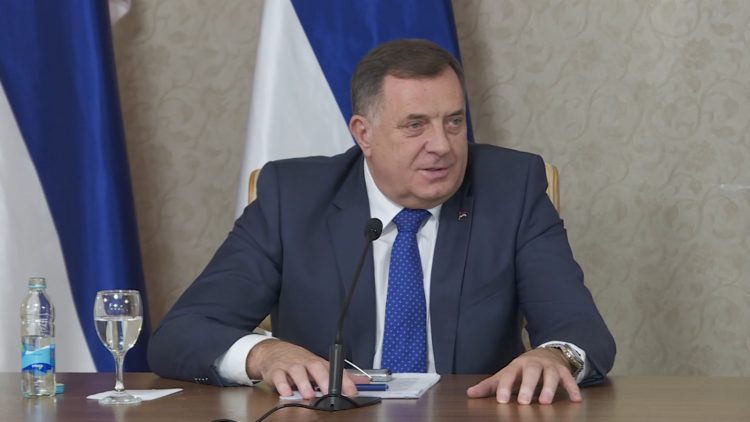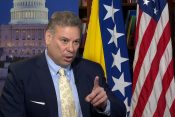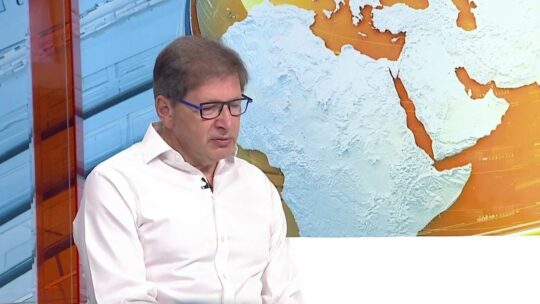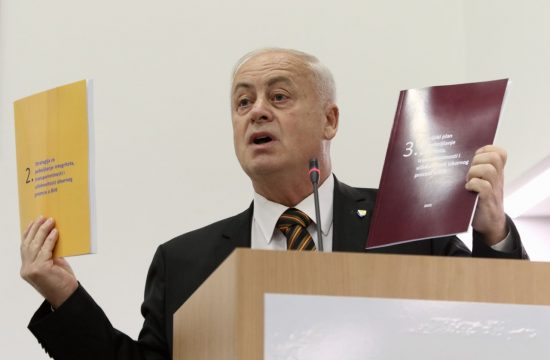
The meeting with US and European Union officials gave no “special result” but was a chance to “clarify certain issues that are being imposed as general issues in Bosnia and Herzegovina,” Serb member of Bosnia's tripartite Presidency Milorad Dodik told a press conference on Wednesday following a meeting with US special envoy for Western Balkans Gabriel Escobar and Deputy Managing Director for Western Europe, Western Balkans, Turkey and UK at European External Action Service Marko Makovec. HE said Republika Srpska will under no circumstances wage war and that its initiatives are solely political.
Escobar and Makovec are currently on a visit to Bosnia and Herzegovina, where they are meeting the country's senior officials and holding talks on major issues that are preventing the progress of Bosnia and Herzegovina.
Dodik also commented on the conclusions of the Peace Implementation Council Steering Board (PIC SB), which condemned the actions of the ruling coalition in Bosnia's Serb-majority region Republika Srpska, and said this was seriously undermining the stability in BiH and the region.
He noted that this body, which passed the conclusions without the consent of Russia, is “neither obligatory nor legal” to be dealing with Bosnia and Herzegovina.
Dodik, who is the leader of the ruling party in Republika Srpska, strongly objects the presence of the international peace envoy in Bosnia and Herzegovina, who gets political guidance from the PIC Steering Board. The Steering Board political directors meet every six months to review the situation in Bosnia and Herzegovina, and provide conclusions and recommendations.
“This meeting of the PIC means nothing,” said Dodik, reiterating his stance about the international peace envoy and saying that neither the envoy nor his office, formally the Office of the High Representative, exist in his opinion.
The Serb leader also repeated that Republika Srpska, the semi-autonomous region where he was elected to the Presidency, will not participate in the work of the central institutions as long as the decision of former High Representative Valentin Inzko on the genocide denial ban is not revoked.
“That decision must be withdrawn before anything else is solved,” he said.
Dodik said it is possible to talk on the topic of genocide or the aforementioned law, to pass some solutions. He dismissed the allegations about Republika Srpska's withdrawal from the central institutions, such as Armed Forces, High Judicial and Prosecutorial Council and Indirect Tax Authority, inciting to war.
“Those are political initiatives,” Dodik stressed, adding that Republika Srpska will “under no circumstances” wage war.
“If someone attacked Republika Srpska, we would fight using political tools. Republika Srpska has a way to defend itself, to strengthen its position,” he underlined.
Referring to the plans for the withdrawal from the state-level institutions and forming those at the entity level, Dodik said Republika Srpska had right on its own army, court and prosecution as well as its fiscal system and that this all is in line with the Constitution and the Dayton Peace Agreement – the peace deal which ended the 1992-95 Bosnian war and established the country's constitutional order. He added that this was all functioning by 2006, when the competencies were transferred onto the state level “by the arrogance of the high representatives.”






Kakvo je tvoje mišljenje o ovome?
Budi prvi koji će ostaviti komentar!